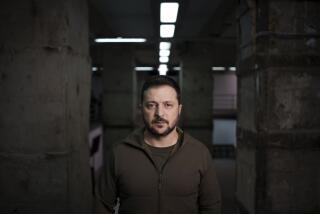Serious Move on Military Gridlock : With a Unilateral Sweep, Gorbachev Fashions a Challenge
- Share via
There were some things that Moscow could do, George Bush said the other day, to increase his confidence that changes taking place in the Soviet Union are real and likely to endure. Scarcely had the President-elect uttered the words than Mikhail Gorbachev began to oblige.
On Wednesday, the Soviet president gave the United Nations a performance of extraordinary range and substance. Many in the West have been calling for policy initiatives to test Gorbachev. Gorbachev has now set his own tests, demanding ones that will go far toward demonstrating his good faith; they also will illuminate his prospects for survival in Soviet politics.
Celebrating the planet’s diversity, this new Soviet man portrayed the freedom of nations to choose their own social path as a “universal principle that should allow no exceptions.” He lauded the Helsinki process and pledged added guarantees to protect the rights of Soviet citizens, including safeguards for freedom of conscience and public association. He linked a promise of liberalized provisions for emigration to an understanding that closed societies have no future. Even while asserting that the Soviet Union would not abandon its convictions, he looked to the experience of other countries as a source of learning.
One might dismiss these tributes to the cause of human rights as mere rhetoric except for the concrete measures that Gorbachev set forth. He committed the Soviet Union to expanded participation in specific international arrangements to monitor human rights. He cited the end of jamming foreign radio broadcasts to the Soviet Union as another step under the Helsinki process. And, perhaps most startling, the Soviet leader declared that the World Court in the Hague should have binding jurisdiction over the interpretation of agreements on human rights.
Gorbachev’s depiction of the impending global challenges to statecraft was at once visionary and ominous. On the face of it, the Soviet leader has as clear a grasp as any leader of the fact that future economic development cannot follow the paths of previous industrialization. He offered no prescriptions to deal with rising environmental dangers, but urged a sensible commitment to cooperate in averting catastrophe. As befits one sobered by the tragedy at Chernobyl, Gorbachev sees the value of a center for emergency environmental assistance within the U.N. system.
At the level of ideals, few of the themes struck by Gorbachev did not resonate with Western sympathies. Of course, it was easy for a Soviet politician to volunteer suggestions about a hundred-year moratorium on the debts of developing countries, debts owed mainly to Western creditors. And it would have been too much to expect Gorbachev to ignore the controversy over the United States’ refusal of a visa for Yasser Arafat to speak at U.N. headquarters (although his rebuke on that score was notably understated).
Yet it was at the level of pragmatic politics that the speech invites most serious scrutiny. First, the usual caveats are in order: The devil is in the details and we still have to see the fine print. Nevertheless, the broad measures announced by Gorbachev as ones to be carried out unilaterally by the Soviet Union would be serious efforts toward transforming the military gridlock in Central Europe.
In particular, the Soviet Union now seems committed to removing more than half of its tanks from East Germany, Czechoslovakia and Hungary. Numbers published by the International Institute for Strategic Studies indicate that this would leave fewer Soviet tanks in those countries than the satellite governments themselves deploy. Other changes to be carried out in the next two years would cut tank strength even further within the Western Soviet Union itself by almost 20% of estimated Soviet armor. Major cutbacks in aircraft, artillery and manpower also are promised. And Gorbachev set a two-year timetable for reducing the kinds of bridging equipment and related forces that have been seen as most suggestive of an offensive potential in Eastern Europe.
Details are still lacking on the final restructuring, but it appears that the Soviets are going to try to persuade the West that, without waiting for agreed mutual reductions in conventional forces, they will reconfigure their posture to a clearly defensive one. It is hard to exaggerate the historic significance of such a shift.
To advance such commitments, Gorbachev had to override the repeated and adamant insistence of Soviet military leaders that there should be no such unilateral cutbacks. Soviet spokesman Gennady Gerasimov denied that the policy change had triggered the military chief of staff’s retirement (first reported in Washington Wednesday), attributing it to health problems. Marshal Sergei Akhromeyev’s departure will be regretted by U.S. military professionals who had found him a straightforward and constructive interlocutor.
Intriguingly, Gorbachev also seemed to go beyond previous Soviet offers regarding the controversial Krasnoyarsk radar, referring to “dismantling and refitting certain units and structures” there. Secretary of State George P. Shultz was quick to pick up on the point, and confirmed that Gorbachev had indeed used those terms.
It will take a while to sort out and respond to these remarkable developments. There is no way for the United States and its NATO allies to reciprocate such unilateral overtures on a similar scale, simply because they don’t have as many chips to sacrifice. But the magnitude and timing of Gorbachev’s offers should lend invaluable momentum to the impending negotiations on conventional forces in Europe, not to mention the strategic-arms reduction agreement, which cannot proceed until the Krasnoyarsk radar dispute is resolved.
Once fully implemented, the Soviet cutbacks would go a good distance toward permitting the talks on conventional-force stability to work from more nearly equal levels in critical sectors.
If he keeps it up, Gorbachev may yet rescue unilateralism from the bad reputation it has earned.
More to Read
Sign up for Essential California
The most important California stories and recommendations in your inbox every morning.
You may occasionally receive promotional content from the Los Angeles Times.













